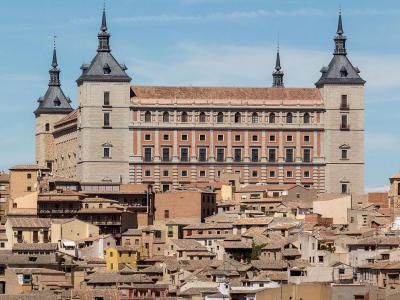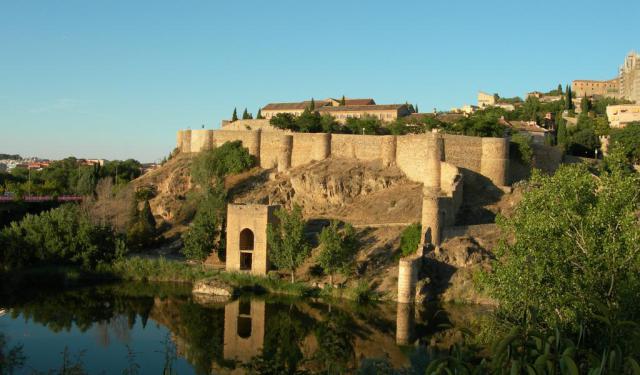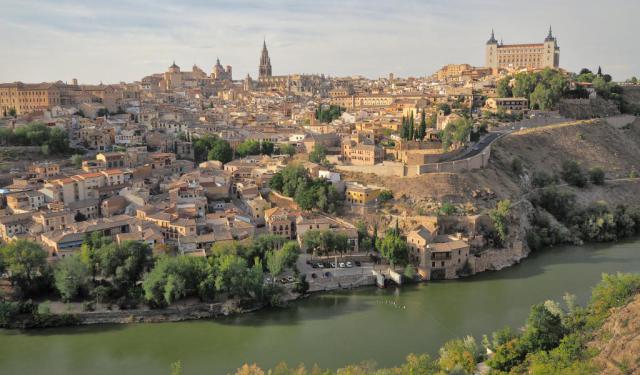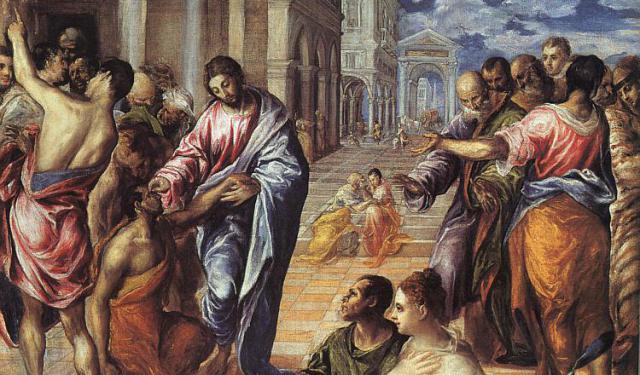Alcazar Fortress, Toledo (must see)
The Alcázar of Toledo has never been content to play a single role. Rising on the city’s highest hill above the sweep of the Tagus River, it has been a Roman fortress, a Visigothic palace, a Muslim stronghold, a Renaissance residence for monarchs, and finally a national symbol forged in fire and war. Its name, “Alcázar,” comes from the Arabic al-qasr, meaning “castle” or “fortress,” a reminder that Toledo was once a jewel of Al-Andalus. Yet even before the Moors, the Romans had fortified this commanding site in the 3rd century. Later, the Visigoths ruled from its walls, and after the Christian reconquest of 1085, King Alfonso VI of Castile rebuilt the structure, weaving it into the reborn Christian city.
By the 16th century, Toledo’s prominence as the capital of Castile inspired Emperor Charles V and his son Philip II to commission major renovations. They entrusted architects such as Alonso de Covarrubias and Juan de Herrera-masters of Renaissance classicism and austere symmetry-to transform the fortress into a palace that would rival anything in Europe. The result was a massive rectangular building anchored by four imposing towers at its corners, its stern Herrerian façade contrasting with the more flamboyant baroque style visible elsewhere in Toledo.
Yet the Alcázar is remembered not only for its stones but also for its stories. During the Spanish Civil War in 1936, Republican forces besieged the fortress for over two months. Inside, Colonel José Moscardó Ituarte held out with Nationalist supporters. In a tragic episode that became legendary, Moscardó’s son Luis was captured and executed after refusing to plead with his father to surrender. When Nationalist troops finally lifted the siege, the Alcázar lay in ruins, but its battered walls came to symbolize defiance and sacrifice for Franco’s regime. Rebuilt after the war, the scars were left visible as reminders of the city’s ordeal.
Today, the Alcázar is home to the Army Museum and the Castilla-La Mancha Regional Library. Tourists can wander its grand halls, admire centuries of military artifacts, and step out onto the ramparts for sweeping views of Toledo’s tangle of stone streets and the river below. A visit here is less about a single period and more about seeing how power, war, and memory have been carved into one commanding monument.
By the 16th century, Toledo’s prominence as the capital of Castile inspired Emperor Charles V and his son Philip II to commission major renovations. They entrusted architects such as Alonso de Covarrubias and Juan de Herrera-masters of Renaissance classicism and austere symmetry-to transform the fortress into a palace that would rival anything in Europe. The result was a massive rectangular building anchored by four imposing towers at its corners, its stern Herrerian façade contrasting with the more flamboyant baroque style visible elsewhere in Toledo.
Yet the Alcázar is remembered not only for its stones but also for its stories. During the Spanish Civil War in 1936, Republican forces besieged the fortress for over two months. Inside, Colonel José Moscardó Ituarte held out with Nationalist supporters. In a tragic episode that became legendary, Moscardó’s son Luis was captured and executed after refusing to plead with his father to surrender. When Nationalist troops finally lifted the siege, the Alcázar lay in ruins, but its battered walls came to symbolize defiance and sacrifice for Franco’s regime. Rebuilt after the war, the scars were left visible as reminders of the city’s ordeal.
Today, the Alcázar is home to the Army Museum and the Castilla-La Mancha Regional Library. Tourists can wander its grand halls, admire centuries of military artifacts, and step out onto the ramparts for sweeping views of Toledo’s tangle of stone streets and the river below. A visit here is less about a single period and more about seeing how power, war, and memory have been carved into one commanding monument.
Want to visit this sight? Check out these Self-Guided Walking Tours in Toledo. Alternatively, you can download the mobile app "GPSmyCity: Walks in 1K+ Cities" from Apple App Store or Google Play Store. The app turns your mobile device to a personal tour guide and it works offline, so no data plan is needed when traveling abroad.
Alcazar Fortress on Map
Sight Name: Alcazar Fortress
Sight Location: Toledo, Spain (See walking tours in Toledo)
Sight Type: Attraction/Landmark
Guide(s) Containing This Sight:
Sight Location: Toledo, Spain (See walking tours in Toledo)
Sight Type: Attraction/Landmark
Guide(s) Containing This Sight:
Walking Tours in Toledo, Spain
Create Your Own Walk in Toledo
Creating your own self-guided walk in Toledo is easy and fun. Choose the city attractions that you want to see and a walk route map will be created just for you. You can even set your hotel as the start point of the walk.
Toledo's Ancient Walls, Gates and Bridges
Other than its signature “Toledo steel”, the Spanish city of Toledo is known for its historic architecture, particularly the ancient mammoth fortifications – a testament to the strength of the city that has maintained its borders for well over a thousand years.
Toledo's soaring walls were first built by the Romans in the 3rd century AD and then further expanded, over the following... view more
Tour Duration: 1 Hour(s)
Travel Distance: 2.1 Km or 1.3 Miles
Toledo's soaring walls were first built by the Romans in the 3rd century AD and then further expanded, over the following... view more
Tour Duration: 1 Hour(s)
Travel Distance: 2.1 Km or 1.3 Miles
Toledo Introduction Walking Tour
Roman historian Livy didn’t bother with flattery. To him, Toledo was “a small city, but fortified by location”-and he wasn’t wrong. Apart from its governance over the Tagus River, the city has long been known as the “City of the Three Cultures”-a place where Christianity, Islam, and Judaism all left visible marks, even if coexistence was not always peaceful. Its name comes from the... view more
Tour Duration: 2 Hour(s)
Travel Distance: 3.2 Km or 2 Miles
Tour Duration: 2 Hour(s)
Travel Distance: 3.2 Km or 2 Miles
El Greco's Masterpieces
Domnnikos Theotokopoulos, most widely known as El Greco or "The Greek," was a Greek painter, sculptor, and architect of the Spanish Renaissance. El Greco was well ahead of his time. His dramatic and expressionistic style is regarded as a precursor of both Expressionism and Cubism of the 20th century.
El Greco was born in Crete, Greece, and studied painting in Italy. In 1577, he... view more
Tour Duration: 1 Hour(s)
Travel Distance: 2.0 Km or 1.2 Miles
El Greco was born in Crete, Greece, and studied painting in Italy. In 1577, he... view more
Tour Duration: 1 Hour(s)
Travel Distance: 2.0 Km or 1.2 Miles






